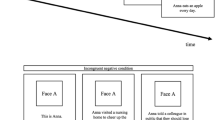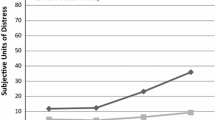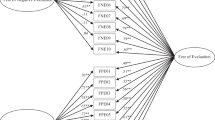Abstract
Two experiments are reported in which dysphoric and nondysphoric subjects were presented (in an acquaintanceship paradigm) with a standardized social communication that contained positive, negative, and neutral information about the speaker, and positive and negative impressions that the speaker had presumably formed about the subject. Groups differed in their recall of evaluative information about themselves, with moderately dysphoric subjects displaying poorer recall. Groups did not differ in their recall of information about the speaker. Moderately dysphoric subjects also displayed relatively negative appraisals of how they thought the speaker perceived them. The results are discussed as being partially inconsistent with cognitive theories of depression, and paradigmatic differences with prior studies are reviewed.
Similar content being viewed by others
References
Alloy, L., & Abramson, L. (1979). Judgement of contingency in depressed and nondepressed students: Sadder but wiser?Journal of Experimental Psychology: General, 108 441–485.
Alloy, L. B., & Abramson, L. Y. (1982). Learned helplessness, depression and the illusion of control.Journal of Personality and Social Psychology, 42 1114–1126.
Beck, A. T. (1967).Depression: Clinical, experimental and theoretical aspects. New York: Harper & Row.
Blumberg, S. R., & Hokanson, J. E. (1983). Effects of another person's response style on interpersonal behavior in depression.Journal of Abnormal Psychology, 92 196–204.
Clark, D. M., & Teasdale, J. D. (1982). Diurnal variation in clinical depression and accessibility of memories of positive and negative experiences.Journal of Abnormal Psychology, 91 87–95.
Coates, D., & Wortman, C. B. (1980). Depression maintenance and interpersonal control. In A. Baum & J. Singer (Eds.),Advances in environmental psychology (Vol. 2). Hillsdale, New Jersey: Erlbaum.
Cohen, J. (1960). A coefficient of agreement for nominal scales.Educational and Psychological Measurement, 1 37–46.
Coyne, J. C. (1976). Toward an interactional description of depression.Psychiatry, 39 28–40.
Coyne, J. C., & Gotlib, I. H. (1983). The role of cognition in depression: A critical appraisal.Psychological Bulletin, 94 472–505.
DeMonbreun, B. C., & Craighead, W. E. (1977). Distortion of perception and recall of positive and neutral feedback in depression.Cognitive Therapy and Research, 1 311–329.
Derry, P., & Kuiper, N. (1981). Schematic processing and self-reference in clinical depression.Journal of Abnormal Psychology, 90 286–297.
Golin, S., Hartman, S. A., Klatt, E. N., Munz, K., & Wolfgang, G. L. (1980). Effects of self-esteem manipulation on arousal and reactions to sad models in depressed and nondepressed college students.Journal of Abnormal Psychology, 89 435–439.
Gotlib, I. H. (1982). Self-reinforcement and depression in interpersonal interaction: The role of performance level.Journal of Abnormal Psychology, 91 3–13.
Gotlib, I. H. (1983). Perception and recall of interpersonal feedback: Negative bias in depression.Cognitive Therapy and Behavior, 7 399–412.
Gotlib, I. H. (1984). Depression and general psychopathology in university students.Journal of Abnormal Psychology, 93 19–30.
Hokanson, J. E., & Meyer, B. (1984). Interpersonal expectancies and preferences for various types of social behaviors of depressed outpatients.Journal of Social and Personal Relations, 1 279–292.
Howes, M. J., & Hokanson, J. E. (1979). Conversational and social responses to depressive interpersonal behavior.Journal of Abnormal Psychology, 88 625–634.
Ingram, R. E., Smith, T. W., & Brehm, S. S. (1983). Depression and information processing: Self-schemata and the encoding of self-referent information.Journal of Personality and Social Psychology, 45 412–420.
Kiesler, D. J., Anchin, J. C., Perkins, M. J., Chirico, B. M., Kyle, E. M., & Federman, E. J. (1975–1976).The Impact Message Inventory: Form II. Richmond: Virginia Commonwealth University.
Kuiper, N. A., & Derry, P. (1980). The self as a cognition: An application to person perception and depression. In N. Cantor & J. Kihlst (Eds.).Personality, social interaction and cognition. Hillsdale, New Jersey: Erlbaum.
Kuiper, N. A., & Derry, P. A. (1982). Depressed and nondepressed content self-reference in mild depressives.Journal of Personality, 50 67–80.
Lewinsohn, P., Mischel, W., Chaplin, W., & Barton, R. (1980). Social competence and depression: The role of illusory self-perceptions?Journal of Abnormal Psychology, 89 203–212.
Nelson, R. E., & Craighead, W. E. (1977). Selective recall of positive and negative feedback, self-control behaviors and depression.Journal of Abnormal Psychology, 86 379–388.
Raps, C. S., Peterson, C., Reinhard, K. E., Abramson, L. Y., & Seligman, M. E. P. (1982). Attributional style among depressed patients.Journal of Abnormal Psychology, 91 102–108.
Rizley, R. (1978). Depression and distortion in the attribution of causality.Journal of Abnormal Psychology, 87 32–48.
Rogers, T. B., Kuiper, N. A., & Kirker, W. S. (1977). Self-reference and encoding of personal information.Journal of Personality and Social Psychology, 35 677–688.
Sacco, W. P., & Hokanson, J. E. (1978). Expectations of success and anagram performance of depressives in a public and private setting.Journal of Abnormal Psychology, 87 122–130.
Sacco, W. P., & Hokanson, J. E. (1982). Depression and self-reinforcement in a public and private setting.Journal of Personality and Social Psychology, 42 377–385.
Seligman, M. E. P., Abramson, L. Y., Semmel, A., & von Baeyer, C. (1979). Depressive attributional style.Journal of Abnormal Psychology, 88 242–247.
Teasdale, J. E., & Fogarty, S. J. (1979). Differential effects of induced mood on retrieval of pleasant and unpleasant events from episodic memory,Journal of Abnormal Psychology, 88 248–257.
Wener, A. E., & Rehm, L. P. (1975). Depressive affect: A test of behavioral hypothesis.Journal of Abnormal Psychology, 84 221–227.
Youngren, M. A., & Lewinsohn, P. M. (1980). The functional relation between depression and problematic interpersonal behavior.Journal of Abnormal Psychology, 89 333–341.
Author information
Authors and Affiliations
Additional information
This research was supported by National Institute of Mental Health Grant MH 29879-03, Jack E. Hokanson, principal investigator.
Rights and permissions
About this article
Cite this article
Loewenstein, D.A., Hokanson, J.E. The processing of social information by mildly and moderately dysphoric college students. Cogn Ther Res 10, 447–460 (1986). https://doi.org/10.1007/BF01173296
Issue Date:
DOI: https://doi.org/10.1007/BF01173296




